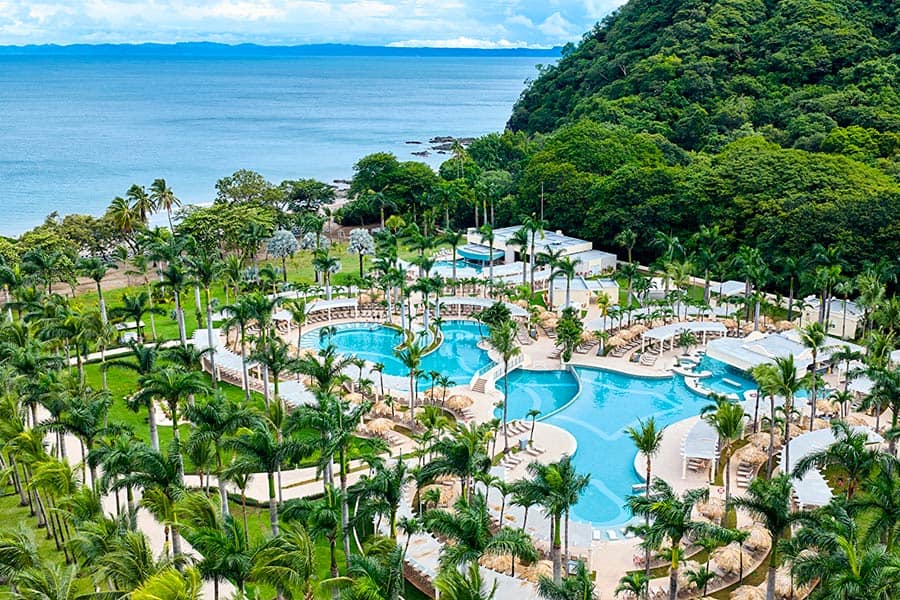Hotel Riu, the recently opened mega-resort in Matapalo de Sardinal in Guanacaste, the northwest province of Costa Rica, is facing legal action after reportedly destroying a portion of a mangrove forest during the hotel’s construction. Confraternidad Guanacasteca, a Sardinal-based environmental group, filed an injunction with the Costa Rican Constitutional Chamber of the Supreme Court (Sala IV) just days after the hotel opened on Oct. 30.
The complaint charges that the Spanish-owned company uprooted mangrove trees that were within the 50-meter public zone, an act forbidden by Costa Rican law. According to witnesses and photographs, the area is now covered with sand and rocks.
Eyewitnesses claim that they have evidence of crews with heavy machinery working at night – from midnight to 6 a.m. – chopping down mangrove trees between May and August of 2009. Documents from the National Geographic Institute (IGN) and Matapalo’s zoning plan demonstrate the existence of the mangrove swamps in 2004. National laws and the zoning plan prohibit their removal.
The IGN drawings, which pinpoint the trees’ exact location, were published in La Gaceta, the official government newspaper, on Dec. 6, 2004, before construction of the 701-room mammoth resort began. Confraternidad Guanacasteca’s complaint claims that four of the official concrete survey markers that designate the boundaries of the mangrove swamp have disappeared.
The conservationist group’s paperwork declares the company’s disregard for the mangroves and the public Maritime Zone is a “violation of the rights of citizens under Article 50 of the Constitution.” That article ensures a “healthy and ecologically balanced environment” for all Costa Ricans.
“The motivation behind this injunction is to prevent the destruction of a beach that was meant for everyone to enjoy,” said Gadi Amit, vice president of the Confraternidad Guanacasteca. “If we allow this kind of behavior to continue, it will cause serious and irreparable damage. What they did was against the law and it requires a response.”
Amit said that the organization is asking the courts to apply “adequate measures to punish Riu,” including “restoration of the natural system to its previous state.”
Although replanting mangrove trees may sound like a simple task, experts say restoring a healthy and viable mangrove swamp after human intervention can be difficult or impossible.
“Man’s activity often transforms the physical or chemical characteristics of a site, making it unsuitable for mangrove development or recovery,” concludes a study by the Coastal Zone Management Unit, a Caribbean-based conservation group. “Such stresses include coastal development.”
Hotel Riu’s legal representative, attorney Roberto Echeverría, told The Tico Times that the company is waiting for the case to be called in the Sala IV, adding that the hotel has complied with all required permits.
Regarding the charge that the hotel destroyed mangrove trees, Echeverría said that “there are no permits to destroy mangroves. That is a question you will have to ask the hotel.” Attempts by The Tico Times to reach the Hotel Riu’s central offices in Spain did not yield results by press time.
This latest case in Costa Rica is not the company’s first brush with legal scrutiny. In 2008, the Costa Rican Health Ministry halted construction after a Nicaraguan construction worker died inside the site’s employee barracks. Health Minister Maria Luisa Avila condemned the workers’ quarters, calling them overcrowded and unsanitary.
More than 300 other Riu workers also were treated in 2008 for respiratory infections, diarrhea and vomiting.
Riu Hotels have also encountered legal troubles for zoning and health violations in Panama and Jamaica.
The chain has announced plans to build two more resorts on the beach at Matapalo, for a total of 2,400 rooms. According to Amit, the chain has obtained at least three concessions from the municipality to build in the state-owned beachfront Maritime Zone. He added that the Confraternidad Guanacasteca has requested that the municipality void the concessions.
In the meantime, the Riu Hotel in Matapalo will continue to operate. Costa Rican President Oscar Arias attended the Oct. 30 opening, giving the mammoth hotel his blessing. His office has not commented on the environmental controversy.






